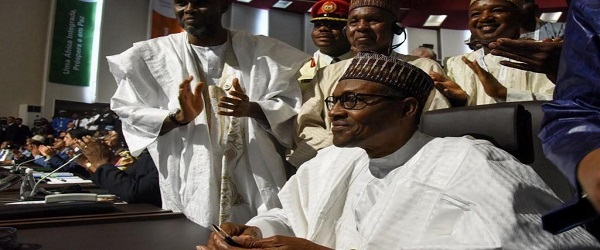08-Jul-2019

The African Union (AU) on Sunday officially signed a major trade
agreement during its summit in Niamey, which has long sought "a historic
step towards peace and prosperity."
fter 17 years of difficult negotiations, the African Union
launched the "operational phase" of the Africa-Africa Free Trade
Area, which was described by Federation Commission President Moussa Feki as
"a historic moment".
"An old dream is coming, and the founding fathers will be
proud of that," Feki said, noting that the African Free Trade Area would
be "the world's largest commercial space."
"This is the largest historic event for the African
continent since the creation of the Organization of African Unity (OAU) in
1963."
AU officials announced the launch of the five "operational
tools" for the FTA.
States agreed on "rules of origin, control and removal of
non-tariff barriers, a unified electronic payment system and an information
center for monitoring African trade", according to the Federation
Commission.
She gave a key shake-up to Nigeria and Benin to push for an
agreement, amid applause at the summit Sunday morning in Niger's capital.
With Nigeria and Benin entering the free trade agreement, 54 of
the African Union's 55 member states have signed it, with the exception of
Eritrea, which has said it is still considering accession.
Some 4,500 delegates and delegates attended the summit,
including 32 heads of state and more than 100 ministers in the Nigerian
capital, which opened a new airport and saw the construction of buildings and
hotels and the construction of large roads.
- A turning point for Africa-
The agreement was formally formalized at the end of April, when
the ratifications exceeded the threshold of 22 States required as a minimum.
ssovo said the trade zone will be operational from July 1,
2020, allowing member states to adapt to changes.
Malawi's trade director Christina Shatima told AFP that the
trade deal was "the beginning of a transformation for Africa."
Most of us are exporting goods to Europe and the US It is
time to start trade between us."
However, despite the launch of the Agreement, fundamental issues
have yet to be resolved among African leaders, particularly with regard to the
rules of origin of a number of sectors.
"There has been no agreement on some of these issues ...
such as textiles and even the automotive sector," she said. "The AU
Secretariat has to make proposals on how to agree on these issues."
he agreement requires most countries to cut tariffs by 90
percent over five years, easing barriers to trade on the continent.
The countries on the UN's list of least developed countries will
have 10 years to cut fees, while a group of six countries including Niger and
Malawi will have at least 15 years of experience, she said.
maka Anko, Africa analyst at the Eurasia Group, described the
move as a positive step but had "a long way to go" with concerns
about the funding of new regulatory bodies.
The African Union estimates that the agreement will boost
intra-continent trade by 60 percent by 2022.
At present, intra-African trade is 16%, compared with 65% for
European countries.
Security in the continent -
The countries of the Sahel (Mali, Niger, Burkina Faso,
Mauritania and Chad), which face difficulties in dealing with the attacks,
especially because of the lack of resources, will seek the support of other
African countries in seeking greater support from the United Nations in the
hope of resorting to Article VII of the UN Charter.
In cases of threats to peace or aggression, this provision
allows recourse to sanctions and even the use of force. It is facilitated by the funding of the
5,000-strong Sahel force, which could be transformed into an international
force, according to the parties concerned.
"We will not refrain from calling for the operation under
Chapter VII," he said, calling for an "international coalition to
tackle terrorism on the coast and Lake Chad, similar to the one that was formed
against a pro-Middle East".
iamey witnessed tight security measures for the African summit.
"We have a special apparatus that includes thousands of
men," said Mohamed Bazoum, interior minister of Niger, which has been
repeatedly attacked by extremist groups in the west and south-east.
ll the venues of the summit were subject to strict security
measures. Soldiers, police and
armored personnel were deployed at strategic points in Niamey.
×
![]()